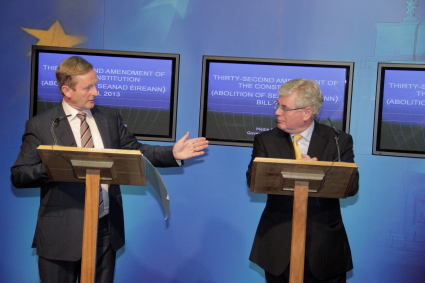
Taoiseach Enda Kenny and Tánaiste Eamon Gilmore at the press conference today
The Taoiseach & Tánaiste today announced the Government’s proposals for the Referendum Bill on the abolition of the Seanad, as committed to in the Programme for Government.
Taoiseach Enda Kenny said:
This Government is delivering on the biggest reform of politics in the history of this State. The Cabinet today approved a bill to hold a referendum on the abolition of the Seanad in the autumn. If approved by the people, I am convinced that we can and will create a better, more effective political system with better accountability, better oversight and better scrutiny of legislation. It is my firm belief that we can have an Oireachtas that is more democratic, more effective and less expensive and it is time the Irish people were consulted and asked to render their verdict.
Tánaiste Eamon Gilmore said:
Democracy is an ongoing project. Our institutions are only as good as the purpose they serve – and that purpose is a fair and effective democracy. The proposal to abolish the Seanad, and have a single chamber parliament, is part of that ongoing evolution. Ultimately, it is for the people to decide whether they want to have two institutions dealing with legislation and holding Government to account, or one. This Government is simply giving them that choice.
It will be necessary in the move to a unicameral system to ensure that the Oireachtas continues to operate effectively and efficiently and to fully scrutinise proposed law, while maintaining all necessary checks and balances and full public confidence.
In this context, it is proposed that following reforms will be advanced by the Government Chief Whip, in consultation with the Opposition and the Ceann Comhairle, as appropriate:
1. As a general rule, major non-emergency legislation will first be submitted to the relevant Dáil committee in Heads of Bill format.
2. To allow for extra consideration and scrutiny, each Bill will be referred back to the committee which considered it at Pre-Legislative and Committee Stages for a final examination after Report Stage and before the Bill is passed by the House. This new stage will be known as Pre-Enactment Stage. It will be provided for in Dáil Standing Orders.
3. It is proposed that a Minister will revert to the relevant select committee within 12 months of the enactment of a Bill, to discuss and review the functioning of the law and to allow for a debate from members and stakeholders as to whether the legislation is fulfilling its intended purpose.
4. As part of a strengthened committee system, there will be 14 Dáil committees: four strategic committees on issues of major strategic and political importance (including PAC, Finance and EU scrutiny); seven sectoral committees to shadow Government Departments; and three thematic committees which will focus on specific issue (petitions, Good Friday Agreement, members’ interests). It is envisaged that each committee will have twelve members and will invite external experts to provide specialist input to its work.
5. When enacted, the Houses of the Oireachtas (Inquiries, Privileges and Procedures) Bill will enable Oireachtas committees to once again undertake parliamentary inquires into certain matters of major public importance. Since such inquires can involve unique and complex legal and policy issues a separate administrative system will ensure that they function smoothly. Once an inquiry is established, it will be undertaken by a sub-committee of the relevant select committee in order to ensure that the work of the select committee can continue uninterrupted.
6. A proposed new Dáil schedule will increase time spent on deliberating legislation.
7. The d’Hondt system will be introduced to distribute chairs of key committees on a proportional and equitable basis. This proposal, if agreed by the House, will go hand in hand with a revised Dáil schedule to allow committees to do as much work as possible when the House is not sitting.
8. A new ‘10 Minute Bills’ procedure will be introduced.
Read the Taoiseach's speech
here.
Read the Tánaiste's speech
here.
Read the full text of the Bill on the Oireachtas website here.